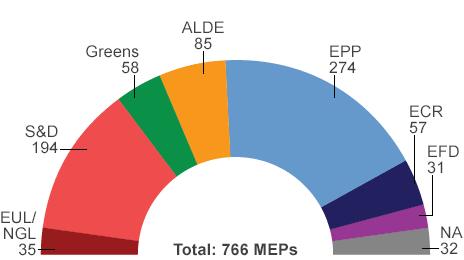European election likely to be tight - polls
- Published
So who's actually going to win these European elections?
There are separate contests in each of the 28 member states, which will be closely watched for their effect on national politics across the continent.
But this post is about which pan-European political group may emerge as the largest in the next European parliament.
The latest projection, external, just released by the parliament and based on recent polls, suggests that it's too close to call.
The centre-right European People's Party (EPP) and centre-left Socialists and Democrats (S&D) are running pretty much neck-and-neck. In the current parliament the EPP is the largest group by some distance, and it does look set to lose seats overall.
The projection suggests 28% (211 seats) for the EPP and 27.4% (206 seats) for the S&D.
The Liberals (ALDE) and the Eurosceptic centre-right group ECR may also have a smaller presence in the next parliament. The projection gives ALDE 8% (62 seats) and ECR 5% (39 seats).
So who gains? Well, this projection suggests the Socialists will have a few more seats than they do now, but perhaps not as many as they would like.
More rebellion?
The wild card will be a much larger number of Non-attached MEPs (projection: 5%, or 38 seats) and those described in this projection as "Other" (9%, or 68 seats). Many of them are either hostile to the EU, or anti-establishment in general.
They will make a lot more noise than they have in previous parliaments.
New political groups might emerge from these insurgent political forces - and the bigger your group, the more funding you get, and the more time you get to speak in debates.

Groups in the current European Parliament. The 2014 election will reduce the number of seats to 751.
EPP - European People's Party (Christian Democrats)
S&D - Progressive Alliance of Socialists and Democrats in Europe (centre-left)
ALDE - Alliance of Liberals and Democrats for Europe (liberal)
EUL/NGL - European United Left-Nordic Green Left (left-wing)
Greens/EFA - Greens/European Free Alliance (Greens and regionalists/nationalists)
ECR - European Conservatives and Reformists Group (right-wing)
EFD - Europe of Freedom and Democracy (Eurosceptic)
NA - Non-attached (MEPs not part of any group)
So the next parliament may be a little more combative - no bad thing.
But the parliament will still be dominated by the mainstream centre-left and centre-right, who will continue to do what they've always done - work out a compromise to get legislation passed.
Does it really matter which group comes first? Well, yes. There are bragging rights. And there's also a new element - the largest group will expect its candidate to become the next President of the European Commission.
The EPP has put forward the former prime minister of Luxembourg, Jean Claude Juncker, while the Socialists have nominated the current president of the parliament, Martin Schulz from Germany.
But there's a snag. National EU leaders may well end up proposing someone else to lead the Commission. A constitutional fight between the Council and parliament could loom large after the elections.